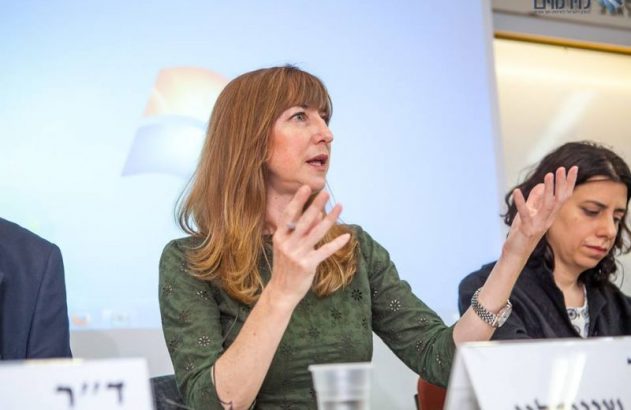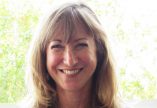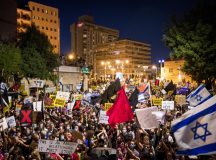Dahlia Scheindlin is a leading international public opinion analyst, a political consultant and a policy fellow at the Century Foundation; she is also co-host of The Tel Aviv Review podcast. Quarantining in Tel Aviv after an overseas visit to family, she found herself pulled between the serenity of the simpler life inside her flat and the call of the protest movement outside her window.
In early 2020, before corona took over, I read A Death in the Family, by Karl Ove Knausgård. From the reviews, I got the impression it took a serious bit of Nordic male chutzpah to think that anyone would want to read hundreds of autobiographical pages of a stranger’s mostly unremarkable life – and then five more volumes. Among the most stinging Hebrew expressions is הוא חופר – which basically means someone is a relentless neurotic nag.
I would never ask anyone to read six volumes about my life, or even 2000 words. I’m writing this diary because I was asked to contribute a diary article on the day I went into two-week quarantine. There isn’t much else to write about.
i) In the battle between me and the new sociology of Covid, I blinked first
I’ve been dreading quarantine, and I assume most people do. Jogging for me is not a luxury but a physical, emotional and mental anchor. Once I had a hectic schedule of meetings, conferences, events and airplanes; in the corona age I already spend too much time in the study.
In Israel, quarantine is not left to anyone’s individual judgment. You simply can’t cross the threshold of your room if you live with people, or your home if you live alone, for 14 days. Police or other authorities are allowed to trace mobile data and have been known to call people from outside their home and ask them to appear at the window. There are rumors of drones hovering outside to check. Violation risks a NIS 5000 fine.
Still, in the battle between me and the new sociology of Covid, I blinked first. After nearly a year since I had last seen my close family, I finally crossed the ocean and willingly throwing myself into a yawning two weeks of total isolation.
ii) First Lockdown
Towards the end of the first lockdown in Israel in April, a well-known Tel Aviv personality wrote on social media that he found ‘the possibility of going back to normal to be extremely disturbing.’ I laughed spontaneously because the post intuitively felt right.
As horrifying as the pandemic was, by late April I realized there was something exciting about the rupture it brought to our lives. Yes, we had never felt more isolated as individuals, but it was a collective experience, shared not only across the country but across the whole world. Thanks to technology, we could all see, read, watch and hear each other going through some localised version of the very same thing. And we had an excuse to be unproductive, to sleep poorly, to act weirdly. Every night I accidentally spilled something, so dependably that I began a photo essay: white quinoa scattered on blue kitchen tiles, a cloud of cinnamon on a pale yellow wall, a mess of business cards splayed across the floor of my study. An academic friend and I spoke on the phone to discuss a chapter we are co-writing, and ended up talking poetry for an hour.
Of course there was awful anxiety. My initial financial shakeup soon stabilised, only to morph into anxiety for close family members and friends, and a collective dread for those far worse off. But the frenzy of connectedness at that time was an adrenaline rush, as if every day was a snow day.
And sure enough, as the Tel Aviv hipster had predicted, the return to normality was hard. Why? Because our new reality is not normal, and unlike the first-wave lockdown, it does feel frighteningly permanent.
iii) At the control center
My second work day in isolation began with a long call with the directors of an Israeli NGO that provides small business training to the most underprivileged women in society, some of whom have barely handled money in their adult lives. I’m conducting a study for them. It is technically complex, and the project has dragged well beyond the timeline. But a few days later, as I watched certain Israeli male legislators mount a foaming-at-the-mouth screed against a bill designed to counter economic abuse in the family. These men were ignorant of the issues and showed no interest in learning. I realised that being engaged, even peripherally, with those working to empower women was providing a tiny consolation for my own rage.
That afternoon I was asked to give a radio interview about elections just held in northern Cyprus. With just a couple of hours to prepare, I called up friends who live there and read the Cypriot press. Suddenly I had the momentary sensation of submerging myself in the small sea between us, and emerging on the other side. Once again I could see the stunning plains and soaring hills where I left a bit of my heart after living there in 2013; I could practically feel the sensation of driving on my beloved roads (on the left).
Later that day I interviewed Ksenia Svetlova for my podcast. Born in Moscow, she immigrated to Israel as a teen and wrote a book about covering half a dozen countries of the Middle East as a journalist with a Russian passport. At night I was back in the Israeli-Palestinian vortex, to speak on a panel about paths forward to conflict resolution. Minutes ahead of the start time the Palestinian speaker pulled out following fears that Saeb Erekat might be dying. By then it was 9:30pm and I was exhausted. But it was a satisfied kind of fatigue, as if I had just traveled around the world, except all these places had come to me.
iv) Looking up
Further into the first week of quarantine and it is becoming clear that I am in quite a good mood.
My mind is quieting itself. There are no decisions to make about when to leave for a meeting, how to get there, what to wear or how fast and badly I can apply makeup. With limited food in the house, there are few choices about what to cook, which forces me to get more creative, and appreciate simple flavors more. (Having a sense of taste, in turn, is reassuring.)
I have learned to jog around the apartment. I nearly sprain an ankle doing a fancy ‘mayim’ step for an invented aerobic routine. I determine that it is legal to dance to Violent Femmes’ 1980s anthem ‘Blister in the Sun’ and convince myself that I look great doing it.
Another day and I spend a shameful amount of time on the phone. By the end, I feel I am developing phone sensitivity skills the way a blind person’s senses migrate to the auditory part of the brain. When a close friend calls, I can tell within seconds that his long drawn-out romantic heartache has flared again. Another friend calls to ask about the accuracy of a certain American polling company, but I know he is really calling because we are each other’s touch-base ritual during corona, which faltered while I was away. I tell him, like so many times before, to look at averages and trajectories and damn the forecasting models. He knows I will say this.
v) Still non-materialist after all these years
People keep asking if I need anything, and beyond a few nice-to-have food items, I find I don’t. To the calm that comes from making fewer decisions is added the absence of stress from all the daily small stuff, which in Israel includes sunglasses, sunscreen, and hats, for example – items are always either strewn all over the house or else nowhere to be found.
The only shoes I need are beach flip flops. I have not sought substances. All this likely ranks me among the world’s most boring people, but I find it reassuring that a remnant of my teenage anti-materialist spirit remains. It simmers somewhere, along with the revolution.
vi) What then do we need to live?
I began quarantine on a Friday, and two Saturday evenings have now gone by – the traditional time for demonstrations. I live in central Tel Aviv and everything that happens in Rabin Square reaches my balcony. This week the demonstrations against the Prime Minister were boisterous.
My critique of Israeli political life runs far deeper than Netanyahu, placing me on the margins of the fairly limited anti-Bibi ‘Leave’ movement. But all things considered, getting rid of him is a decent starting point, and since 1997, it feels like I have attended a thousand demonstrations.
Now the noise is coming in stereo as people march; the pull is there and I’m sorry to be missing it. As always, half of me wishes to throw myself into the cause, and another half craves to watch, observe the people, scribble down chants and interview someone. This time, I know, I will have to let other people do the work.
But my disappointment surprises me. For months now, I have experienced a near-total despair about the state of leadership in Israel, in the US, and about the currents of human nature that brought us here. I attended demonstrations but felt lackluster. I didn’t write a thing.
Quarantine on some level turned out to have the tranquility of Walden Pond. What if I don’t miss regular life so much? Maybe travelling only in my mind and having less material clutter are liberation. Maybe I’ve honed my sensitivities better by phone, maybe I’m more intimate in writing, rather than the awkwardness of looking into another person’s eyes.
But, in the end the racket I heard outside last night feels like home. Like Phil Ochs, I know I can’t add my name to the fight when I’m gone, so I guess I’ll have to do it while I’m here.


































